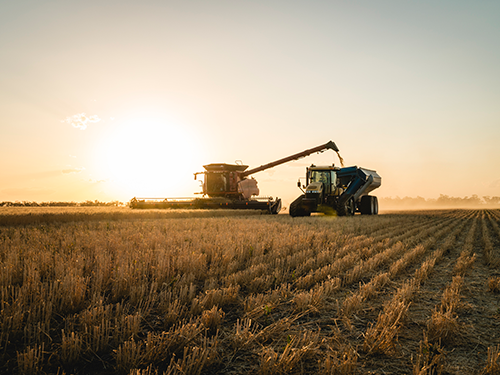Combine Safety is Key During Harvest Season
Sep 22, 2025

Harvest is one of the busiest and most stressful times of the year. With long days, heavy workloads, and the push to get crops in before the weather turns, it can be tempting to cut corners on combine maintenance or safety checks. But a little extra attention goes a long way in protecting both your machine and the people working around it.
The first step in keeping your combine safe is to have a routine inspection.
Before heading into the field, take time to walk around the machine, looking for fuel or oil leaks, worn belts, and buildup of residue around hot components. Crop dust and chaff are highly flammable, and when mixed with heat from the engine or bearings, they create a real fire hazard. Carrying a fire extinguisher in the cab and cleaning debris from the machine at the end of every day are simple habits that can prevent a need to call the fire department.
Operator awareness is just as critical.
Fatigue is common during harvest, and tired eyes can miss obstacles in the field or lapses in traffic safety when moving equipment on the road. Taking short breaks, staying hydrated, and avoiding late-night rushes help keep both the operator and the machine safe. If more than one person is working with the combine, clear communication is essential to prevent accidents during unloading or servicing.
Finally, proper storage at night matters. Parking on bare ground away from dry vegetation reduces the chance of fire spreading if something goes wrong. A quick check of fuel levels, lights, and tires before shutting down ensures you’re ready to roll the next day.
By treating combine safety as a priority instead of an afterthought, you not only protect a major investment but also safeguard the harvest you’ve worked on all year long.
The first step in keeping your combine safe is to have a routine inspection.
Before heading into the field, take time to walk around the machine, looking for fuel or oil leaks, worn belts, and buildup of residue around hot components. Crop dust and chaff are highly flammable, and when mixed with heat from the engine or bearings, they create a real fire hazard. Carrying a fire extinguisher in the cab and cleaning debris from the machine at the end of every day are simple habits that can prevent a need to call the fire department.
Operator awareness is just as critical.
Fatigue is common during harvest, and tired eyes can miss obstacles in the field or lapses in traffic safety when moving equipment on the road. Taking short breaks, staying hydrated, and avoiding late-night rushes help keep both the operator and the machine safe. If more than one person is working with the combine, clear communication is essential to prevent accidents during unloading or servicing.
Finally, proper storage at night matters. Parking on bare ground away from dry vegetation reduces the chance of fire spreading if something goes wrong. A quick check of fuel levels, lights, and tires before shutting down ensures you’re ready to roll the next day.
By treating combine safety as a priority instead of an afterthought, you not only protect a major investment but also safeguard the harvest you’ve worked on all year long.